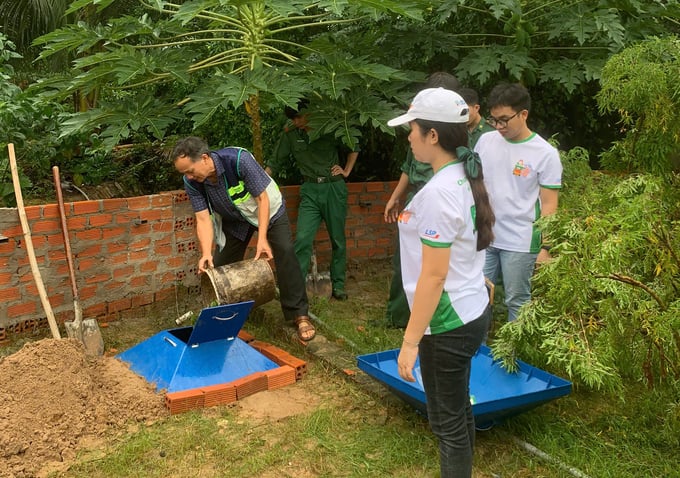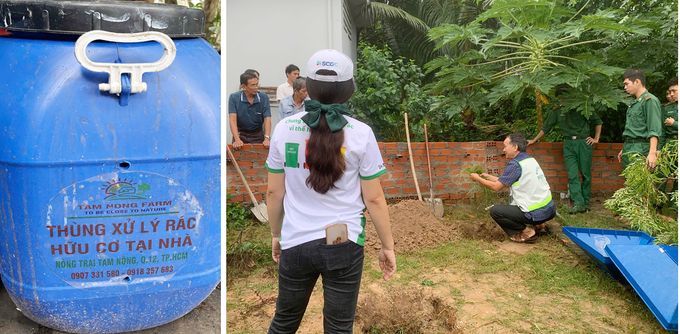May 30, 2025 | 05:24 GMT +7
May 30, 2025 | 05:24 GMT +7
Hotline: 0913.378.918
May 30, 2025 | 05:24 GMT +7
Hotline: 0913.378.918

Dr. Nguyen Van Bac, Deputy Head of the Southern Office, National Agricultural Extension Center (Ministry of Agriculture and Rural Development), trained farmers in Ba Ria - Vung Tau province on the project of classifying waste at source towards a circular economy, treating organic waste at home.
According to statistics from the Ministry of Natural Resources and Environment, the country generates about 68,000 tons of solid waste daily, including organic and inorganic solid waste. However, up to 65% of this total waste is being treated by direct landfilling.
From January 1, 2025, people across the country will have to classify solid waste at the source. Therefore, it is necessary to propose solutions to convert organic waste into organic fertilizer on a household scale.
According to Dr. Nguyen Van Bac, Deputy Head of the Southern Office, National Agricultural Extension Center (Ministry of Agriculture and Rural Development), on average, each person generates about 1kg of solid waste, of which about 50-70% is organic waste such as leftover food, expired food, vegetables, fruits, meat, poultry, seafood, cooking oil, etc. discarded after preliminary processing and cooking.
Therefore, it is necessary to communicate to people in rural and urban areas to classify household waste and encourage food waste to produce organic fertilizers and animal feed.
According to Dr. Nguyen Van Bac, in recent times, local agricultural extension centers have also had solutions to propagate and guide people to classify waste and turn organic waste into organic fertilizers. However, they have mainly focused on the Northern region.
Talking about solutions for composting organic fertilizers in households, Dr. Nguyen Van Bac said that it is possible to use standard organic waste compost bins combined with microorganisms to support the speed of waste decomposition, create quality fertilizers, control odors and insects, save space and time, promote the habit of handling organic waste, reduce the cost of buying fertilizers, and protect the environment.

Dr. Nguyen Van Bac guides on composting organic fertilizer.
“Thanks to the optimal design, ideal conditions of humidity, temperature, and airflow of standard compost bins, the decomposition process takes place more quickly and effectively. This helps to reduce the time and effort needed to process organic waste into high-quality, nutritious, and safe organic fertilizer for plants,” said Dr. Nguyen Van Bac, adding that by making their own organic fertilizer, households, and agricultural establishments can reduce the cost of buying chemical fertilizers and reduce their dependence on it. Homemade organic fertilizer is safe for plants and helps save a significant amount of money.
Dr. Nguyen Van Bac said that treating organic waste at home consists of 4 steps.
Step 1: Prepare a compost bin with a capacity of about 100-200 liters with a lid on top to protect against rain and sun; drill holes around the sides to ventilate; open a hinged window at the bottom of the bin to easily remove manure. A small hole should be drilled at the bottom of the bin to drain water during the composting process (if any).
Step 2: Prepare a convenient location for the bin and Sumitri or Men-Padco microorganisms.
Step 3: Sprinkle a thin layer of Sumitri or Men-Padco microorganisms on the bottom of the bin before putting in the waste. Put the waste in layers, with each layer about 10-20 cm thick, depending on the porosity/compression of the waste. Sprinkle the amount of Sumitri or Men-Padco microorganisms in a 125g package divided equally for 300-500 kg of waste. Mix in more powdered soil, Sumitri, or Men-Padco into the bin to spray/water evenly to ensure enough microorganisms for the waste. Cover the bin to prevent rain from washing away the microorganisms or sunlight from drying out the microorganisms, which will make them less active.
Step 4: You can add trash to the bin daily and monitor the thickness of the trash layer, then sprinkle more preparation. After 6 weeks, the garbage will become compost and can be taken out for use.

Dr. Nguyen Van Bac also noted that if the waste is roots, stems, leaves, grass, and garden waste, if it is too large, it needs to be chopped into small pieces so that microorganisms can quickly come into contact and work.
In addition, daily waste, no matter how small, should be put into the bin immediately to ensure hygiene; when the waste layer is thick enough to be 10-20 cm, microorganisms should be added. It is possible to mix both daily food waste and vegetable roots, stems, and leaves to compost together.
"Do not check the compost every day because it will lose heat, affecting the activity of microorganisms. Check it every 5-7 days to add moisture if necessary," Dr. Bac added.
Dr. Nguyen Van Bac added that when compost is taken out of the bin, it is best to let it dry in the wind for 1-2 days to reduce the temperature before applying it to plants. This organic fertilizer contains many essential nutrients such as nitrogen, phosphorous, potassium, and other micronutrients, helping improve soil structure and enhance plant growth.
Translated by Huong Giang

(VAN) Ms. Nguyen Thi Dung, Deputy Director of Ngoc Hoang Cooperative, shared about the journey of bringing dragon fruit to Europe, achieving annual revenues in the billions of VND.

(VAN) Bamboo products from Thang Tho Bamboo Cooperative have reached many countries around the world, while also creating jobs for local workers.

(VAN) The Management Board of Con Dao National Park reported that a green sea turtle, tagged in the Philippines, has traveled thousands of kilometers to lay 84 eggs on Bay Canh Islet.

(VAN) Green technology is paving a new path for sustainable aquaculture in the Mekong Delta in particular and across the country in general, helping reduce emissions and adapt to climate change.

(VAN) On May 27, La French Tech Vietnam (the French startup and innovation community in Vietnam) held the French Tech Summit Vietnam 2025.
/2025/05/27/4731-2-223159_980.jpg)
(VAN) No votive paper, no styrofoam, no plastic bags, no plastic bottles, and no single-use plastic trays are the key rules tourists should keep in mind when visiting Con Dao.

(VAN) In the fight against plastic pollution, Vietnam has been demonstrating a proactive, pioneering, and active role in addressing the greatest environmental challenge today.